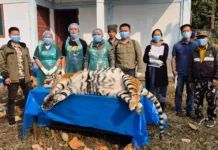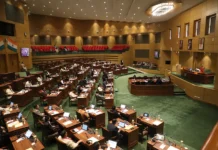[ Bagiso Hakung ]
The Education Ministry of the state initiated during the last academic year a range of transformative measures as a commitment to its efforts in reforming and uplifting the state’s education system – Mission Shikshit Arunachal, Mission LEAP, Digi-Kaksha, and more. Each of these reflects a forward-thinking vision for inclusive, modern, and outcome-oriented education.
Among them, one initiative that truly stands out for the common man is the ‘Bagless Saturdays’.
Designed to enhance the learning and exploring skills and creative abilities of students from Class 1 to Class 12, it carries a noble intent – to shift away from rote learning and engage children in more experiential, joyful, and activity-based education.
At the completion of one year of ‘Bagless Saturdays’, a question emerges before the lay public and the parents, as much as it should for the educational planners and the educators: Has the Bagless Saturday experiment started achieving its intended goals? If so, how? How much?
There’s no denying that the idea is innovative and holds the potential to address foundational issues in the learning process, as was attempted in the DPEP during late 1990s. However, it is also really pertinent to know what were the experiences at the ground level, at the schools, as it was being implemented as envisaged by the government.
Some of the aspects that any keen well-wisher of Arunachali youths and their educational progress would like to learn could be:
- Were the teachers and the heads of schools given any orientation and practical hands-on training before the day was launched?
- Did these training sessions take place at the state, district, block and the school levels?
- Has the state trained up a team of master-trainers at the state as well as the district level?
- Did the schools and teachers receive any activity kit and materials for use?
- Did the schools receive any sci-fun activity kits for use of the students? A range of moderate and low-priced kits suitable to rural Indian students are now available in the market.
- Were the schools given guidelines or directives to involve the resource persons from the community? They could be guest speakers/performers – especially in the areas of popular science, public health, promoting environment education, eco-friendly practices, art, and traditional crafts. Apart from NGOs, library professionals can impart reading for fun and creative writing skills. (Needless to say, the Bagless Saturdays did not mean ‘no reading, no library or reading activities for fun.)
- Was any literary or art festival conducted by the schools or the districts during the year?
- Were the private schools practising the initiative? If so, how? Do the DDSEs get regular feedback from them? If private schools are not practising a public education initiative, shouldn’t they too be? Nearly 30% of Arunachal’s students are in private schools (The Hindu, 4 Aug, 2022.)
For an effective evaluation of the Bagless Day intervention by any agency, the following aspects need to be considered:
Documentation
- What were the guidelines for the schools in documenting Saturday activities?
- Were all teachers advised to prepare daily outcome records? Did they do so?
- Did the schools prepare and maintain monthly consolidation of such records?
- Were they being submitted to the DDSEs? Or monitored by them?
- How was the state Education Department monitoring the field experiences in the districts?
Review
- What were the common types of activities conducted by the schools/districts?
- Did the schools/districts organise any literary or art festival to highlight the achievements of their students?
- Were the feedback from the schools and the districts being reviewed by the DDSE and the state Education Department?
- Did the annual performance appraisal of the teachers, heads of schools or the DDSEs mention these achievements by them? Do they get any weightage in the ACR for innovative performances?
Feedback to the schools
- Did the teachers, schools and the DDSEs receive any periodic feedback on their performances?
- Were any independent authorities attending the Bagless Saturday sessions as observers?
- Were local resource persons from the community invited to do sessions for students?
It will greatly benefit the state education authorities if the schools and DDSEs, as well as parents are invited to give their overall suggestions, if the programme has to be continued next year.
As a lay citizen and a member of a students’ body in the state, I interacted with many students of government schools and asked them if the Fun Saturday is really implemented. They replied sincerely, “Yes, it is. However, most of the time we clean our school and go back to our homes.”
In many cases, what was meant to be a day of joyful, meaningful engagement is reduced to routine activities or poorly planned sessions, leaving students unengaged. I also observed some of the schools closing down after assembly and attendance.
Thus, on the ground, the experience may not always reflect the aspirations of the state planners.
As a new academic session is to commence in June, it would be worthwhile if the government conducts a total review of its implementation across the state. It is obvious that to make any new initiative impactful, consistent monitoring, teacher training, resource support, and feedback from the grassroots level stakeholders -including the students – are crucial. With the right attention, this initiative can become a cornerstone of educational reform in Arunachal – helping nurture not just smarter students, but a happier, more curious, learning Arunachali society tomorrow. (The contributor is pursuing MA in economics and is in charge of the IPR of the All Mishmi Students’ Union).


